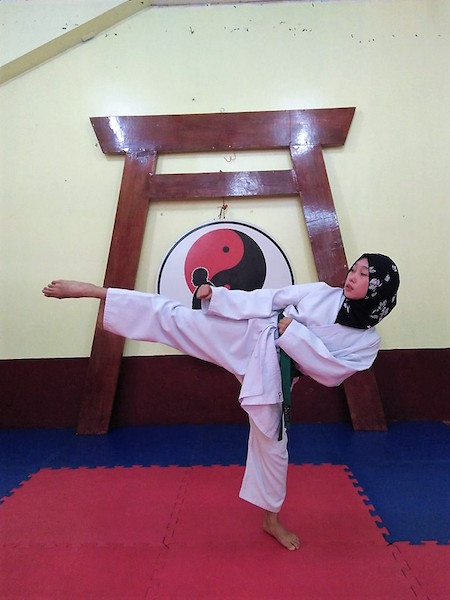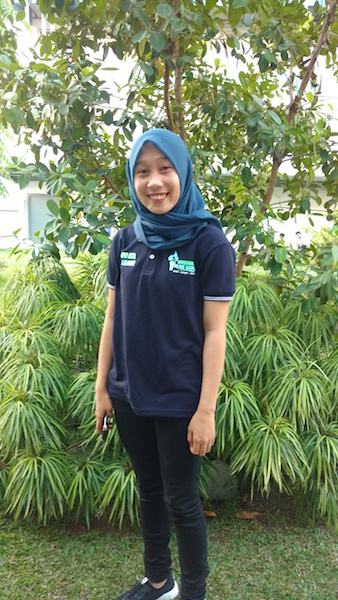Sports first captured Nanii’s imagination when her father let her tag along to his tennis matches. She was still in kindergarten at the time. Watching her dad compete and enjoy his time out on the court sparked in her a fire for sports that is still burning today.
Fast forward fifteen years, the 20-year old Hananiya Abubacar Baruang — Nanii to her friends –- is in her fourth and final year of the Bachelor of Science in Physical Education at Mindanao State University (MSU) in Marawi.
Doing something worthy
A varsity student at MSU, karate is the sport Nanii applies herself to. Her first encounter with the sport came in 2014 during a summer outreach program at the MSU Karate Club.
“My friend and I joined the program after graduating from high school. As we had already passed the college entry exams, our summers were wide open. I soon realized that this was the sport for me. Karate made me feel capable of doing something worthy. I am not a genius in school, but with karate I can excel in different ways.”
 Hananiya Abubacar Baruang, a student at the Mindanao State University in Marawi City says karate “has made me feel more active, more aware of myself, and more aware of the things I’m going to do.”
Hananiya Abubacar Baruang, a student at the Mindanao State University in Marawi City says karate “has made me feel more active, more aware of myself, and more aware of the things I’m going to do.”
Photo courtesy of Hananiya
In keeping with her interest in sports, for her undergraduate thesis Nanii plans to write about the motivational climate in sports in relation to Maratabat, an important, age-old concept in Maranao culture. She will conduct part of her research at her karate club. Nanii is part of the Maranao community, a predominantly-Muslim region of Mindanao.
Pride and sportsmanship
Roughly translated as‘self pride,’ Maratabat in Meranaw culture plays a role in any interaction, be it with family members, colleagues, fellow students or friends. “It can be a simple action, a conversation, something that negatively affects the other person that can trigger Maratabat.The most common reaction is shouting, but in the most severe situations there can be physical contact as well.”
Nanii believes that this pride poses an obstacle for the development of sports culture in her community, a cause she’s deeply passionate about. “Maratabat can get in the way of sportsmanship. Instead of engaging within I hope to show people that engaging with each other can help us to understand the other person better. A culture of mutual understanding will help us build a good sports culture.”
Beyond sports
In karate, Nanii found the positive influence she needed to gain this perspective on how people treat one another. “When I entered the club I learned about self-control and how to control my feelings. Yes, it’s a combat sport, but it goes beyond that. Karate helped me become a better person.”
Through karate Nanii has become clearer in her purpose. “Doing karate has made me feel more active, more aware of myself, and more aware of the things I’m going to do. I want to be a coach or physical educator to teach others the values that I’ve learned through karate. I want to make a difference in my community, and by doing so in our Mindanao as well.”
Well aware of the conflicts plaguing Mindanao, Nanii is convinced that sports can help create peace on the island. “Many of the problems we have come from that we Mindanawons let our religious and cultural differences take precedent over the many things we have in common. Sports can help bridge those differences because it unites us in the single objective of winning. And to win you need teamwork and patience. Or put differently: you need unity. That’s a message I hope to spread loudly and clearly.”
Unity under fire
That there are threats to that unity became especially apparent with the Marawi siege in May of 2017. Nanii was on the MSU campus when the attack started. “We were on our soccer field with visitors from the Philippine Sport Commission when we heard gunshots. Being relatively far away from downtown Marawi and thinking it would all end soon, we pretty much ignored it the first week. We were also nearing the end of the semester. But then soldiers from the army came telling us to go home.”
Her father sent Nanii and her siblings to stay with an aunt in Iligan. They didn’t go back until after the occupation that lasted for five months and ended in October. All that time, Nanii didn’t play any sports.
 Hananiya Abubacar Baruang wants to “make a difference in my community, and by doing so in our Mindanao as well.” Photo by
Hananiya Abubacar Baruang wants to “make a difference in my community, and by doing so in our Mindanao as well.” Photo by
PATRICK VAN WERSCH
When she returned to Marawi the city felt different to her. “Downtown Marawi is usually very busy, with vendors and cars everywhere. When I came back the city felt like an isolated area which was new to me. It made me feel sad and I admit that I’m still not used to it. However, businesses are trying to start over despite having lost everything. People are trying to get on with their lives again.”
Don’t get rattled
Nanii thinks her own role in rebuilding the community could be to become a leader that inspires others through sports. “I could help my people to appreciate martial arts as a way to not only build physical fitness but self-confidence and self-control as well.”
That ambition might be more timely than ever as the number of crime incidents against women in Marawi has risen in recent months. “There are abductions, women going missing, it’s tragic. I could help women in my community by teaching them basic self-defense. If you are trained in martial arts and you get into a threatening situation you don’t get rattled so easily. You feel more prepared which could potentially save your life.”
Women leaders
Empowering women to not only take care of themselves and their families but lead their community as well is a cause close to Nanii’s heart. “Women possess the confidence, capabilities and knowledge needed to be good leaders. They can sense what people feel and they are very much attuned to the situation in their community. What we need is opportunity and people shining a light and leading by example. Sports can provide those opportunities, shine those lights, and develop those role models.”
Her view on the power of sports as a force for peace is not limited to her native Meranaw. Nanii would like to see a feeling of unity grab hold of the entire island of Mindanao. That, in turn, she hopes would set an example for the entire nation. “We need more mutual understanding in this country. Luzon, Visayas, Mindanao; we are in it together. But I think it’s fair to say that the people of Mindanao feel understood the least.”
“What our Mindanao needs right now is to feel it is being seen. That people care about what’s happening. The more we interact and build relationships, the more we can together have a clear perspective.”
[Together with over 40 other women student athletes from 12 colleges and universities from all six regions of Mindanao, Hananiya participated in the second annual Mindanao Leadership Summit for Athletes (MLSA) in Butuan City on July 26-28, 2018.
The MLSA is part of the Mindanao Peace Games (MPG), a joint initiative of colleges and universities across Mindanao that aims to develop empowered women who will be inspiring and transformational leaders in initiating better and peaceful communities in Mindanao. For more information contact the Convener of the Mindanao Peace Games, Mr. Noli Ayo. You can follow MPG on Twitter (@MPG2018) and Instagram (mindanao_peace_games)]
The author, Patrick van Wersch, 32, is a Dutch writer and journalist from the Hague, the Netherlands. Based in Davao City, Patrick writes stories featuring young Mindanaons. In these stories, they share their passions, hopes and challenges as they shape the future of their Mindanao. Other topics Patrick covers in his writing include peace and development, sports, and culture and society. Patrick holds an MA Degree in Journalism from VU University, Amsterdam and a BA in European Studies from Maastricht University. Visit his website atwww.vanwerschwrites.com]
